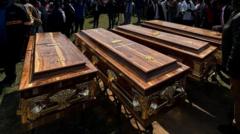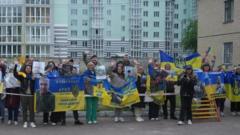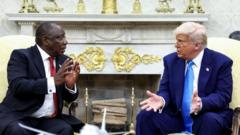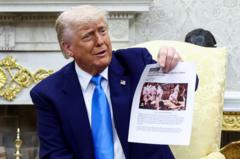A roadside memorial became the focal point of President Trump's claims about violence against white farmers in South Africa, leading to widespread misinformation and local discontent among communities directly affected.
Misleading Claims About South African Memorial Spark Controversy
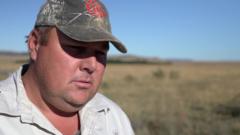
Misleading Claims About South African Memorial Spark Controversy
President Trump's depiction of a memorial as a burial site ignites debates on race relations in South Africa.
Article text:
The P39-1 road in South Africa, recently thrust into the global spotlight, has become a stage for political controversy following President Donald Trump's on-air remarks linking it to persecution of white farmers. The video, broadcasted during a public confrontation with South African President Cyril Ramaphosa, erroneously referred to a temporary memorial as a burial site, igniting a firestorm of debate about race and violence in South Africa.
This highway, connecting Newcastle to Normandein in KwaZulu-Natal, is lined with the haunting imagery of crosses symbolizing the tragic deaths of farm residents, notably brought to light following the brutal murders of Roland Collyer's aunt and uncle in 2020. Trump's video featured aerial shots of these crosses, leading to claims of genocide against Afrikaners that many found misleading and inflammatory.
Upon visiting the memorial site, it quickly became clear that the crosses, once planted to honor victims, had long since been removed. Roland Collyer, who witnessed the aftermath of his relatives’ deaths, explained that the crosses represented a public outcry over safety in farming communities. “This section of the road might have been a memorial, but it certainly was never a burial site,” he clarified.
Local residents echoed Collyer's sentiments, expressing their disbelief over the global attention driven by Trump's statements. Rob Hoatson, who organized the initial memorial, affirmed its temporary nature and stressed that the memorial was meant to spotlight violence rather than indicate a mass burial ground.
Despite the contentious narrative, Collyer, who remains vigilant about farming in the area, expressed hope for reconciliation among South Africans, emphasizing that communities can unite irrespective of race. His sentiments about the ongoing struggle against violent crime and the complexities of representing their plight in the global media highlighted a longing for understanding and connection rather than division.
As the community grapples with questions of safety and justice following two convictions in the Raffertys' murders, the conversations surrounding racial dynamics continue to evolve. Many local residents, including their black neighbors, express a desire for harmony while acknowledging the shadows of a troubled history amidst ongoing tensions.
While Trump's claims stoked fears and resentment, Collyer remains resolute about staying in South Africa, honoring his family's legacy while striving for a more peaceful future. “It's this land that my family has cultivated for generations,” he remarked as he spoke of his commitment to building a better life together with his community.
As discussions over the mortality of white farmers persist on international platforms, the broader context of South African society reveals a more complex reality, one where unity and endurance are paramount to rebuilding trust among all racial groups.
The P39-1 road in South Africa, recently thrust into the global spotlight, has become a stage for political controversy following President Donald Trump's on-air remarks linking it to persecution of white farmers. The video, broadcasted during a public confrontation with South African President Cyril Ramaphosa, erroneously referred to a temporary memorial as a burial site, igniting a firestorm of debate about race and violence in South Africa.
This highway, connecting Newcastle to Normandein in KwaZulu-Natal, is lined with the haunting imagery of crosses symbolizing the tragic deaths of farm residents, notably brought to light following the brutal murders of Roland Collyer's aunt and uncle in 2020. Trump's video featured aerial shots of these crosses, leading to claims of genocide against Afrikaners that many found misleading and inflammatory.
Upon visiting the memorial site, it quickly became clear that the crosses, once planted to honor victims, had long since been removed. Roland Collyer, who witnessed the aftermath of his relatives’ deaths, explained that the crosses represented a public outcry over safety in farming communities. “This section of the road might have been a memorial, but it certainly was never a burial site,” he clarified.
Local residents echoed Collyer's sentiments, expressing their disbelief over the global attention driven by Trump's statements. Rob Hoatson, who organized the initial memorial, affirmed its temporary nature and stressed that the memorial was meant to spotlight violence rather than indicate a mass burial ground.
Despite the contentious narrative, Collyer, who remains vigilant about farming in the area, expressed hope for reconciliation among South Africans, emphasizing that communities can unite irrespective of race. His sentiments about the ongoing struggle against violent crime and the complexities of representing their plight in the global media highlighted a longing for understanding and connection rather than division.
As the community grapples with questions of safety and justice following two convictions in the Raffertys' murders, the conversations surrounding racial dynamics continue to evolve. Many local residents, including their black neighbors, express a desire for harmony while acknowledging the shadows of a troubled history amidst ongoing tensions.
While Trump's claims stoked fears and resentment, Collyer remains resolute about staying in South Africa, honoring his family's legacy while striving for a more peaceful future. “It's this land that my family has cultivated for generations,” he remarked as he spoke of his commitment to building a better life together with his community.
As discussions over the mortality of white farmers persist on international platforms, the broader context of South African society reveals a more complex reality, one where unity and endurance are paramount to rebuilding trust among all racial groups.




